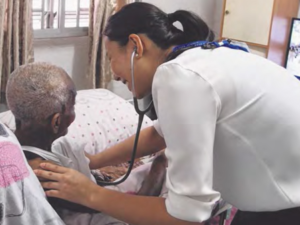Palliative care at home for patients in their final months
Kok Xing Hui, The Straits Times – One man, who wanted to be known only as Mr K, told of how his 90-year-old father used to fall sick and had to be warded every two months on average. “He refused to stay in the hospital,” the 50-year-old recalled.

A patient under the Temasek Cares – Project Dignity scheme being visited at home by a team from Dover Park Hospice to administer palliative care. The frequency of home visits depends on the patient’s condition. PHOTO: DOVER PARK HOSPICE
“The nurses would come in and see him on the floor beside the bed. It was obvious that he was trying to run away.”
Patients like these are why a pilot programme has been started to provide palliative care for advanced dementia patients at home.
The initiative, called Temasek Cares – Project Dignity, was jointly set up by Tan Tock Seng Hospital, Dover Park Hospice, and non-profit organisation Temasek Cares last October.
Patients are referred by the hospital and visited at home by hospice staff. Temasek Cares – the philanthropic arm of Temasek Holdings – is providing $2 million in funding over three years.
Programme director Dr Allyn Hum said that advanced dementia patients are prone to infections and often admitted to hospital by their family members.
“But when these patients get sick and go to hospital, they get very frightened,” she said. “It’s hard to see this, and makes us think: ‘Why aren’t we caring for them at home?’”
Her team – including doctors, nurses and social workers – teaches family members what to expect during the final stage of dementia. The frequency of home visits ranges from once a day to once a month, depending on a patient’s condition.
Family members of those on the scheme can also call a round-the-clock hotline for help in emergencies.
“The main thing is knowing that there is someone you can turn to for advice,” said a 57-year-old whose mother is on the scheme.
The man, who wanted to be known only as Mr Koh, said: “Prior to this, if her heart beats fast, we would panic and call the ambulance.”
Source: Palliative care at home for patients in their final months. The Straits Times © Singapore Press Holdings Limited. Reprinted with permission.




